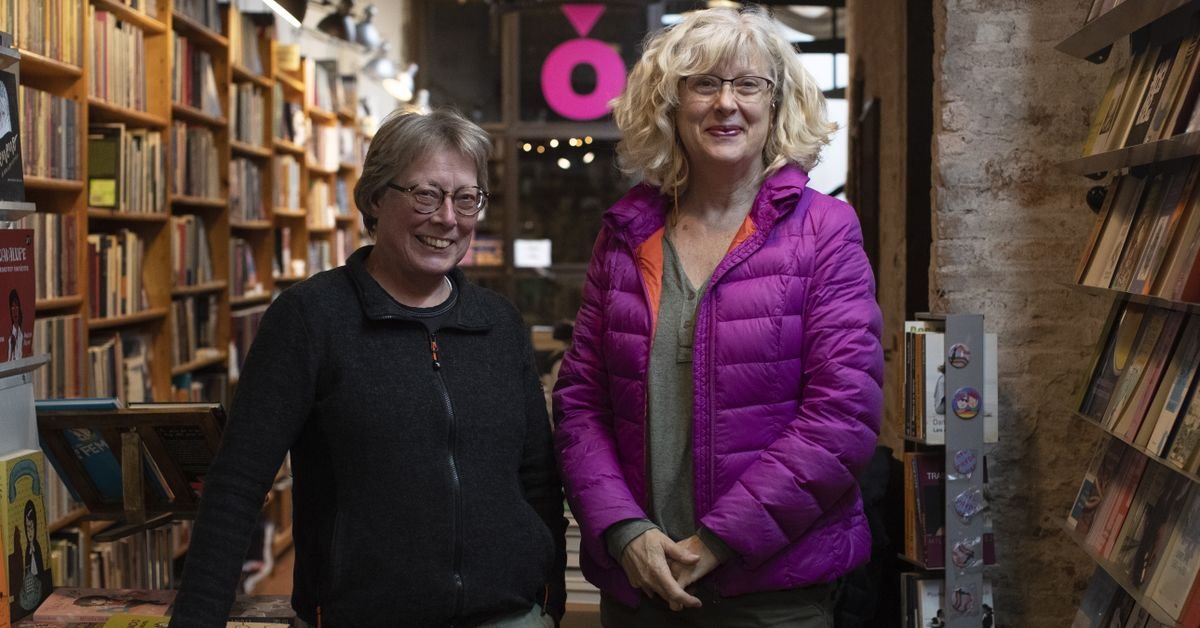Your card expires on Update your payment details to continue enjoying your infoLibre subscription. The information you receive is up to you.
It looks like you had trouble completing your infoLibre subscription. Complete the process in just a few minutes and support us. The information you receive depends on you.
Your payment information is incorrect or incomplete. Update your information to renew your subscription and avoid canceling your infoLibre subscription.
culture
Edgar Sapiña Manchado
The Accomplices ceases to exist. Connie Dagas and Helle Bruun sell all the books they can until the end of the year, close the shutters, and take with them the memories of a lifetime dedicated to their fulfilled dream: opening an LGBTQ+ bookstore in the historic center of BarcelonaAnd so it has been. That is their satisfaction. The Cómplices bookstore puts an end to his days After 29 years of activism. That is their merit, which is no small feat. They have written a piece of history, being the second bookstore of its kind in Spain, only behind the Madrid one Berkana —They opened in April 1994, while the one in the capital did so in December 1993.
They leave their second home, number 4 Cervantes Street, quietly. They leave because They retire… semi-retired. The publishing house that they also built from nothing, Egales, will continue. “We are overwhelmed. It’s difficult. We feel excited, tired, stressed…”, Connie Dagas summarizes to infoLibre"These days we do crying sessions with clients," he says with a smile. His partner in crime, Helle Bruun, nods her head repeatedly, while laughing out loud.
“People are very grateful and also sad, because they say: And now where do we go, who are we going to talk to?", says Bruun. Nothing can replace the treatment of these two booksellers, But fortunately, they paved the way for more spaces like this to appear in other areas of the city. This is the case of Antinous, which opened in 1997 in Ciutat Vella and is now located in the Eixample district. Or on the outskirts of the city, in Nou Barris, the transfeminist and LGBTI bookstore Peripheral Action, which was inaugurated this year by neighborhood activist José Antonio Martínez Vicario.
The beginnings, back in the second half of the 1990s, were not easy, neither for them nor for the readers. “In a way we were disappointed, because we thought that people would have very curious, as it happened in New York, Paris or London, but here It took a long time for people to come in, They were afraid of being seen entering an LGBT bookstore,” Bruun recalls. To make a promo, they didn’t even influencers No advertising on Instagram, Twitter, or Spotify. None of that existed. That's why they stuck papers to every post they came across, flyers which were distributed in the gay bars in the area, as well as by the Casal Lambda association, with 46 years of history of fighting for the recognition of the rights and freedoms of the LGBTI community.
Other that It was how they made a living from it. "It took us many years to get to this point," they say. Meanwhile: “Without coffee, with pasta and eggs…”, They recount with a smile. “People from outside thought it was all a lot of glamor, because, of course, gay people, with so much money… I said: a lot of money yes, but not for books either", Dagas concludes.
Little by little they were opening a gap. So much so that this place served as a refuge for many“There were a lot of people eager to talk. For many of us, we were the first people they told they were gay; that's happened to us, many times,” says Bruun. “I think the bookstore has been a place where people felt truly free to talk about their feelings. For the first four or five years, We were more psychologists than booksellers", says Dagas.
It was a time when telling who one was, depending on how, was paid for with the expulsion from home: “Fortunately, all this has changed, after the pandemic it has come here lots of young people and we love to be able to see that They come with their parents and even with their grandparents“That never happened before,” they say.
Why Cómplices? Quite simply: “It had to be a name that she [Connie points to Helle] could pronounce. Don't forget that she's Danish, and her Spanish when we opened left a lot to be desired,” Dagas confesses, laughing.Accomplices were easy and it's an international name, which is easy to pronounce in French and English and it seemed super appropriate because, in the end, what we wanted with people was complicity." It all started when they both met, babysitting children in England. There the two They shared their dream of opening a bookstore.
Life took them down different paths: Dagas stayed in London, while Bruun moved to Malta with his Spanish wife. Finally, fate brought them to Barcelona, where everything took shape, with the help of some friends who owned the premises and rented it to them at a friend's rate. “We know bookstores that are always in a hurry And if you have a lot of expenses, you don't have a salary and it's a circle that doesn't... with low expenses and a publishing house, two of us survive, but just barely," says Bruun.
Egales was like a lifeboat. “Helle had the brilliant idea to say: Hey, either we create a publishing house or this doesn't work.", explains Dagas. And from there things began to change. One stumbling block was that at that time, LGBTQ+ titles were mostly in English, while Spanish literature was limpingAnd Egales was a stream for the translation of works, as well as opening the way for new scribes.
The publishing house was founded in 1995 by Cómplices and Berkana. It currently has more than 350 different titles, making it "a benchmark for the LGBTQ+ public not only in Spain but also in Latin America."
While the conversation is going on, Dagas and Bruun take turns serving the customers, some of them friends, who have come these days to say goodbye—and to take home some Christmas reading material with a 20% discount. “I’m sorry you’re closing,” one of them says to Dagas, who explains that now they'll have more time for themselves and that they're happy. Meanwhile, in a matter of hours, the long, colorful aisle of eye-catching titles that makes up the bookstore will give way to other hands, dedicated to who knows what tasks.
“I went for the first time in 2007, to buy some graphic novels by Sebas Martín,” recalls Oriol Osan, another Cómplices fan, who said, “It was a place where you knew with almost complete certainty that you would almost certainly find that strange title that, for obvious reasons, interested you.” “Their long history, activism, and activism are something to be applauded, but when a cultural facility closes, it’s a source of sadness,” he laments.
Libraries are also another tentacle of these two booksellers' goal of bringing LGBTI literature to all audiences. And there have been loyal ones, such as the Sagrada Familia library in Barcelona and the Clot library, as both explain. "Now there are others around Barcelona, in Santa Coloma de Gramanet, Manresa, Sabadell..." they list. "It's noticeable that there are also beginning to be “A generational change in libraries”"It's been almost 30 years, so a lot has happened," Bruun says.
However, much remains to be done. And one of the key aspects for both booksellers, get straight readers interested for LGBTQ+ stories. “Just as we've always read heterosexual literature, we don't understand why they can't do the same with LGBTQ+ literature,” they reflect.
The hustle and bustle of selling and packing up is clouding their vision of what they'll do after the holidays. "We haven't had time to think about it yet," they admit. “Read more books”, Bruun says. “And walking, seeing friends, going to book presentations we haven't been able to attend for years…” Dagas continues. Not forgetting his work at the helm of Egales.
“We want to take advantage of this thank all the people "We've had so many clients over the years, because thanks to them we've been able to be here, so the favor is mutual. This can't be forgotten; without clients, we wouldn't exist," they recall.
And the future... looks good, according to them. "A couple of years ago I didn't see it, but now I do. There's many young people who are starting activism again, "I was a little asleep, so I'm optimistic," Bruun thinks. "It's a pleasure to be able to close and see this huge difference, that many things have changed," Dagas says. "Be careful, you have to be very alert and not let your guard down, because that's when they take away your rights," he urges. Meanwhile, the coming and going of clients, who have become family, continues.
Where is the LGBT history?
Give an infoLibre subscription to whoever you want and receive the new signed book by Jorge Javier Vázquez, 'Antes del olvido'. The person you gift it to will enjoy reading the entire book. unlimited content, browse no advertising, comment on the news, write articles in Freethinkers and much more! This Christmas, give the gift of quality journalism.
1923-2023 Julian Casanova
Happy exit and entry Luis García Montero
The fifth paragraph: the constitutional storm
Carlos Castresana: "Judicializing politics ends up politicizing justice." Antonio Contreras
Javier Aroca: "We must recognize that the government is being brave." Antonio Contreras
The pages I have visited
Doors
My Reader Pick for the 2022 Harvest
Follow us on social media
Subscribe so that we can continue investigating and doing quality journalism







